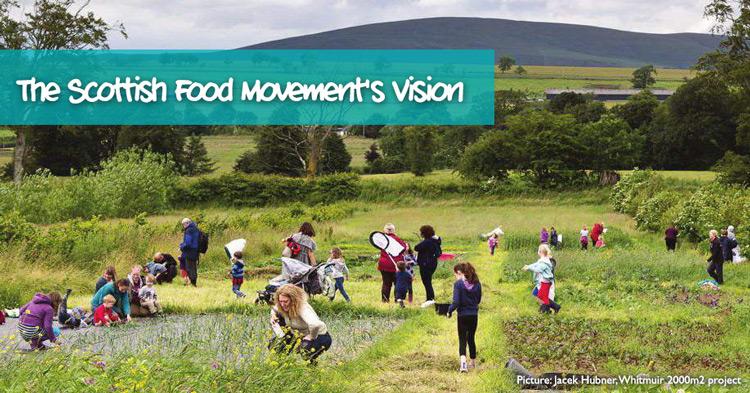Beyond Fried Mars Bars and Poutine: Scotland and Canada Reform their Food Systems

By Susan Alexander
In 2017, the governments of Scotland and Canada will launch consultations towards new legislation for their food systems. What can we learn from each other about becoming good food nations?
Historically, Canada’s strong links with Scotland are rooted in agricultural revolution and food shortages. The Highland clearances of the 18th and 19th centuries drove Scottish crofters – small tenant farmers without security of tenure - off their farms as landlords enclosed common lands and replaced mixed farming with sheep. Many immigrated to Canada. In Scotland as in Ireland, the mid-19th century potato famine propelled further emigration to North America. In turn, these Scottish migrants were part of the colonial disruption of Indigenous food systems.
Now, in 2017, Scotland and Canada are considering how their food systems can be reformed to tackle 21st century challenges. Both countries are set to launch consultations sometime this year about new legislation; in Scotland it’s a Good Food Nation Bill, and in Canada a National Food Policy. The historical problems of food insecurity, access to land and sustaining rural communities exist in contemporary forms, joined by new issues like climate change and obesity.
The Scottish Food Movement’s Vision
Plenty: Food, Farming and Health in a New Scotland, the 2016 report of the Scottish Food Coalition, lays out civil society’s vision for the future of food. Like their Canadian counterparts in Food Secure Canada, they take a systems approach:
“People face the double burden of poverty and ill health, whilst our natural resources, animals, and workforce are exploited. To reimagine the food system, so that everybody can access enough good food, we need to see that all these problems are connected and we need to question the very system that underpins our approach to food.”
Amongst a wealth of policy ideas, three key legislative demands are highlighted: enshrining the right to food in Scottish law; promoting agroecology; and creating a statutory Food Commission. This third demand, about statutory, ongoing and participatory governance of the food system, chimes with the work being done in Canada towards a National Food Policy Council.

Policy innovation – the retail and caterer’s levy
Health and food activists everywhere have struggled with how to move beyond a focus on individual diet choices to confront and change what the market offers. Piecemeal taxes on sugary drinks, for example, have met with concerted opposition from industry. Plenty goes much further, proposing that Scotland introduces a “retail and caterer’s levy” which would require supermarkets and restaurants to report on the nutritional composition of their sales, and pay a levy on the difference between that result and national nutritional standards.
The brainchild of Peter Ritchie, Executive Director of the campaigning NGO Nourish Scotland, it is, simply put, a tax on selling too much unhealthy food. It is a bold policy proposal that highlights the enormous impact of the food environment within which consumers shop and eat.
We are what we eat
Fried Mars bars from fish and chip shops happy to deep-fry anything and heart-attack-on-a-plate poutine are caricatures of the eating habits of two proud nations. However, both Scotland and Canada are facing diet-related health crises that demand action. In Scotland, two thirds of adults and a third of children are overweight or obese, with Canada doing only slightly better. A traditionally uninspiring food culture (or lack of one) has not helped.
Scotland is encouraged by its Scandinavian neighbours, where the ‘New Nordic Kitchen’ has been impressively successful in creating a democratic and healthy food culture. With similarly inauspicious antecedents, since 2004 the Nordic countries have championed traditional ingredients and processes, and fostered innovation, to create a food culture and branding that now enjoys global renown. Chefs played a key role in defining the new cuisine and the active participation of all sectors of government and society was a vital success factor.
Sustainability
Obviously, Scotland and Canada have very different terrains and agricultural sectors. Broadly stated, Scotland needs to import food and Canada can export it. That said both the Scottish and Canadian governments are putting very significant emphasis on the agricultural and food and drink sectors as key drivers of economic growth. Their food movements are grappling with how to produce, consume, import and export food in ways that are healthy and sustainable for all people and the planet.
In Scotland, the food movement is pushing to establish agroecology – that is the science of sustainable farming - as the underlying principle of farming and fishing. If adopted this approach would significantly lower Scotland’s direct production of greenhouse gas emissions. The Plenty report further suggests measuring and setting targets for Scotland’s consumption emissions, recognising that imported food (and livestock feed and other agricultural inputs) generates emissions elsewhere.
The only certainty is uncertainty
Canada may have to contend with unpredictable President Trump as a neighbour, but Scotland is dealing with Brexit – the decision of the UK to leave the EU – that has now triggered a snap general election in June 2017, which is highly likely to be followed by a second Scottish independence referendum. Nourish Scotland campaigned to remain in the EU on the basis that in terms of the food system it was better on balance for people, the environment and the economy. Scotland agreed but the overall vote across the UK was to leave.
According to Peter Ritchie the silver lining is the opportunity to start new conversations and make better policy:
“It would be great if the space opened up by Brexit could create fairer food and farming policies across the whole UK. For a year or two, the public will be interested. So civil society needs to set out not just a tweak to the subsidy system or an ask on food labelling: but a new framework for legislation and governance, replacing the 1947 productivist UK Agriculture Act with a Sustainable Food Act. In coming months Nourish will be campaigning for an ambitious and effective Good Food Nation bill.”
Food Secure Canada wishes them every success.
Susan Alexander is a communications specialist, currently putting down roots in the Montreal food movement.
* Thanks to Peter Ritchie and Olga Bloemen of Nourish Scotland for their background information and briefing.
- Identifiez-vous pour poster des commentaires

